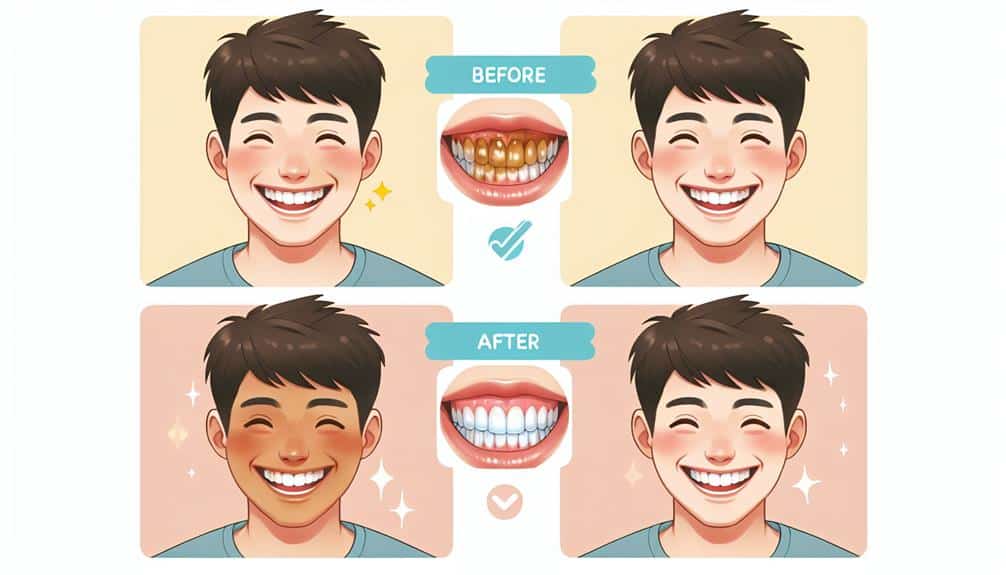Brighten your coffee-stained teeth naturally with these tips. Choose whitening toothpaste with hydrogen peroxide and natural ingredients like baking soda. Try oil pulling with coconut oil for improved oral health. Make a paste of baking soda and lemon to scrub away stains, but use it sparingly. Rinse with diluted apple cider vinegar to combat stains and maintain oral hygiene. Consider activated charcoal for removing stains, but be gentle to avoid enamel damage. These methods offer natural ways to whiten teeth effectively.
Key Points
- Use hydrogen peroxide for stain removal and enamel strength.
- Consider oil pulling with coconut oil for plaque reduction.
- Try a baking soda and lemon paste for surface stain removal.
- Rinse with apple cider vinegar to combat coffee stains naturally.
- Use activated charcoal sparingly to remove stains and brighten teeth.
Whitening Toothpaste Options
When looking for whitening toothpaste options, consider products containing hydrogen peroxide for effective stain removal. Hydrogen peroxide has been shown to be a powerful ingredient in breaking down and removing stains caused by coffee and other pigmented foods.
In addition to hydrogen peroxide, it's important to check the fluoride content in the toothpaste you choose. Fluoride is essential for strengthening enamel and preventing tooth decay, making it a significant component in maintaining overall oral health.
When selecting a whitening toothpaste, also pay attention to the presence of natural ingredients. Natural ingredients such as baking soda, coconut oil, and activated charcoal can provide gentle whitening effects without causing harm to the enamel. These ingredients work to remove surface stains and brighten the teeth gradually over time.
Oil Pulling Benefits for Teeth
Discover the numerous benefits of oil pulling for your teeth, a traditional oral hygiene practice known for its potential to improve oral health. Oil pulling involves swishing a tablespoon of oil in your mouth for about 15-20 minutes on an empty stomach, then spitting it out. This method is believed to reduce harmful bacteria in the mouth, leading to fresher breath, healthier gums, and potentially whiter teeth.
Research suggests that oil pulling with coconut oil can help in reducing plaque formation and combating gingivitis, a common gum disease. The lauric acid present in coconut oil has antimicrobial properties that may contribute to improved oral hygiene. Additionally, the swishing action during oil pulling is thought to help dislodge bacteria and food particles from crevices in the teeth.
While oil pulling can be a beneficial addition to your oral care routine, it's essential to note that it shouldn't replace regular brushing and flossing. Consider incorporating this natural remedy into your regimen for overall oral health maintenance.
Baking Soda and Lemon Paste
To further enhance the natural brightening of coffee-stained teeth, consider using a homemade paste of baking soda and lemon. This combination is a popular choice among those seeking natural remedies and DIY treatments for teeth whitening. Baking soda, also known as sodium bicarbonate, is mildly abrasive and can help scrub away surface stains on teeth caused by coffee, tea, or other pigmented foods.
Lemon, on the other hand, contains citric acid, which has natural bleaching properties that may aid in lightening teeth discoloration.
When combined, baking soda and lemon create a paste that can be gently applied to the teeth using a toothbrush or fingertips. It's crucial to note that while this mixture can be effective in removing stains, excessive use may erode tooth enamel due to the abrasive nature of baking soda. Hence, it's advisable to use this DIY treatment sparingly and not as a daily routine.
Always consult with a dental professional before trying any new whitening method to ascertain it's safe for your teeth and gums.
Apple Cider Vinegar Rinse
Consider incorporating an apple cider vinegar rinse into your oral care routine to help combat coffee stains on your teeth naturally. Apple cider vinegar is known for its antibacterial properties, which can aid in maintaining good oral hygiene. The acetic acid in apple cider vinegar helps remove stains and kill bacteria in the mouth, making it a popular natural remedy for teeth whitening.
To create an apple cider vinegar rinse, mix one part apple cider vinegar with two parts water. Swish this solution around in your mouth for about 30 seconds to 1 minute, then spit it out. Be cautious not to use apple cider vinegar undiluted, as its acidity can erode tooth enamel over time.
In addition to using apple cider vinegar as a rinse, remember that maintaining good oral hygiene practices and making smart diet choices can also help prevent and reduce coffee stains on your teeth. Regular brushing, flossing, and dental check-ups, along with limiting coffee consumption and rinsing your mouth with water after drinking coffee, can all contribute to a brighter smile.
Activated Charcoal Application
Using activated charcoal for teeth whitening is a popular natural method believed to help remove stains and brighten your smile. Activated charcoal is known for its absorbent properties, which can bind to substances like tannins found in coffee that cause stains on your teeth. One of the main benefits of using activated charcoal is its ability to effectively remove these stains, giving your teeth a whiter appearance.
When applying activated charcoal to whiten your teeth, it's essential to do so with caution to avoid damaging your enamel. To use charcoal effectively, mix a small amount with water to create a paste. Gently brush the paste onto your teeth, ensuring even coverage. Allow the charcoal to sit on your teeth for a few minutes before rinsing thoroughly. Remember not to use activated charcoal too frequently, as it can be abrasive and may wear down your enamel over time.
Frequently Asked Questions
Can Coffee-Stained Teeth Be Permanently Whitened Naturally, or Will the Effects Wear off Over Time?
You can achieve long-term whitening with natural remedies, but maintenance is key. Consistent preventive measures can help combat staining. Remember, the effects may vary, but commitment to oral health enhances the chances of prolonged results.
Are There Any Potential Side Effects or Risks Associated With Using Baking Soda and Lemon Paste to Whiten Teeth?
When using baking soda and lemon juice paste for teeth whitening, be cautious of potential risks. Lemon juice's acidity may erode enamel, leading to sensitivity. Baking soda can be abrasive, causing enamel wear if used excessively.
How Often Should One Use an Apple Cider Vinegar Rinse to Effectively Brighten Coffee-Stained Teeth?
To effectively brighten coffee-stained teeth, consider the benefits and risks of using apple cider vinegar. Use it sparingly; excessive use may erode enamel. Aim for once a week to maintain balance between vinegar's benefits and potential risks.
Is It Safe to Use Activated Charcoal on Teeth, and Are There Any Precautions to Take When Using It for Whitening Purposes?
Using activated charcoal on your teeth can be effective for whitening, but precautions are essential. Tooth sensitivity may occur, so consult a dentist. Long-term results and safety concerns should be considered before starting this method.
Are There Any Specific Types or Brands of Whitening Toothpaste That Are Particularly Effective for Removing Coffee Stains From Teeth?
When it comes to removing coffee stains from your teeth, opting for the best toothpaste is key. Look for effective brands known for their stain-fighting ingredients. Consistent use can help brighten your smile naturally.



